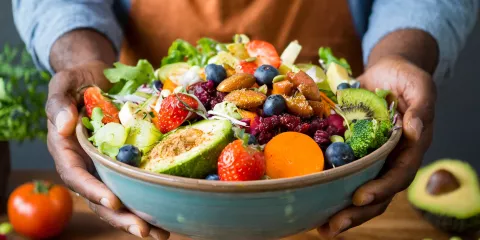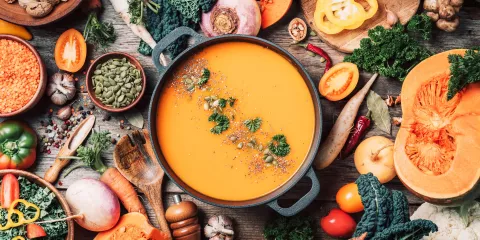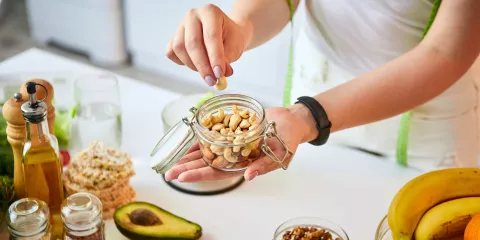
Specialty diets are extremely popular in the world of wellness and offer a number of potential benefits for weight control, gut health, and overall health. However, it’s common for these diets to eliminate certain food groups, leaving out some important nutrients. Here are the nutrients you may be lacking if you follow one of these diets, and foods to eat to avoid deficiency.
Plant-Based Diets
There are a few ways to follow a plant-based diet. The most common ways include:
Lacto-Ovo Vegetarian - does not include meat, but does include eggs and dairy.
Pescatarian - Does not include meat, but does include seafood.
Vegan - Avoids all meat and animal products.
Protein is a common concern for some plant-based diets, as they lack the high quality source of protein - lean meat. However, getting enough protein isn’t difficult if you consume plenty of other sources. For example, vegetarians and pescatarians usually get plenty of protein from dairy, eggs, and fish. Vegans can also get protein from meat alternatives like tofu or tempeh, as well as from legumes such as beans, lentils, and peas. Nuts and seeds offer a decent amount of protein as well.
If you follow a plant-based diet, you’ll want to keep an eye on vitamin B12 as well. Most vegetarians can get enough if they eat dairy and eggs. However, you will likely need to supplement this nutrient if you follow a vegan diet.
Finally, following a plant-based diet may put you at risk for low iron levels. The iron we consume comes in two forms: Heme iron from meat, poultry, and fish, and non-heme iron from plants like leafy greens, nuts, seeds, and beans. Our bodies absorb heme iron much more efficiently than non-heme iron. However, it’s possible to avoid iron deficiency with plenty of non-heme iron foods. Pairing these foods with a source of vitamin C such as citrus fruit or broccoli can help your body absorb more iron as well.
Paleo
The paleo diet is based on the concept of what a caveman likely ate, including only foods that can be hunted or gathered. This usually limits foods in this diet to lean meat, fish, fruits, vegetables, nuts, and seeds.
If you follow a paleo diet, you might be missing out on some of the nutrients most commonly found in grains, dairy and legumes. The most important nutrients to look out for are calcium, vitamin D and B vitamins. If your diet is lacking in calcium and vitamin D over a long period of time, your bone health may suffer. Furthermore, many people are vitamin D deficient already, which may increase risk for heart disease. Finally, eliminating grains and legumes makes it difficult to replenish your body with water-soluble B vitamins. These are important for energy production and red blood cell production, meaning you could become anemic if you don’t get enough.
It’s easy to supplement calcium, vitamin D and B vitamins if needed. You can also boost your vitamin D levels with daily sun exposure. In fact, one study found that only 13 minutes of sun exposure a few days per week provided enough vitamin D levels to prevent deficiency, although more exposure is recommended to reach optimal levels.1
You can also include some of these paleo-friendly foods to avoid deficiency:
Calcium: leafy greens, almonds, sardines
Vitamin D: fatty fish and egg yolk
B Vitamins: salmon, greens, liver, eggs, nuts and seeds
Gluten-Free
Gluten is the protein found in most grains, including wheat. Most people choose to eliminate gluten from their diet to avoid uncomfortable symptoms of gluten sensitivity or intolerance such as gas, bloating, diarrhea, constipation, headaches, and skin problems.
However, eliminating wheat and other foods that contain gluten may strip your diet of important vitamins and minerals. Some of these include fiber, folate, and magnesium. Without enough fiber, your digestion may suffer, causing constipation. Fiber is also important for heart health and blood sugar control. Eating plenty of fruits and vegetables will help you get the recommended daily amount.
Most of us get the bulk of our magnesium from wheat. If you follow a gluten-free diet, it’s important to eat other magnesium-rich foods like leafy vegetables, nuts, and seeds. Magnesium plays a role in many processes in the body, and deficiency is fairly common among people who avoid gluten.
Low-Carb and Keto
Low-carb diets are currently extremely popular for weight loss. However, diets that restrict carbohydrate intake to the extreme, like the ketogenic diet, carry some risk for nutrient deficiencies.
Restricting carbs means avoiding grains, legumes, some dairy, fruits, and even some vegetables. These diets are often very high in fat and protein. Since there are so many restrictions with the more extreme versions of this diet, it’s easy to miss out on some vital nutrients.
Fiber is the biggest concern on a low-carb or keto diet, since these diets leave out fiber-rich foods like grains, legumes and fruit. The combination of low fiber and high protein and fat can cause digestion issues like constipation, and may even put your heart health at risk. Studies show that Americans struggle to get enough fiber even on a normal diet2. Therefore, getting enough may be a challenge on a low-carb diet. To make sure you’re getting enough, make sure your limited carb intake is filled with fiber-rich fruit and grains. Also be sure to eat plenty of fiber-rich, keto-friendly vegetables like broccoli, Brussels sprouts, celery, and kale.
In Summary
If you’re thinking about trying a new diet or eating style, it’s a good idea to put plenty of time into researching the benefits, potential downsides, and things to consider before you jump in. It’s also a good idea to talk to your doctor before beginning any overly restrictive diet. Any diet that restricts entire food groups is likely to fall short in some nutrients. If you’re aware of any limitations beforehand, you can take the appropriate steps to ensure you’re getting plenty of the nutrients you need.












